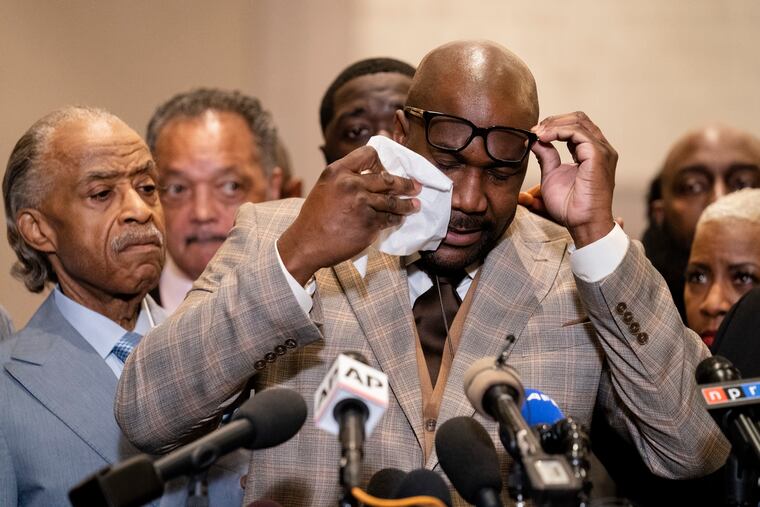George Floyd’s family carries the pain of all the Black families who came before them | Solomon Jones
On the one-year anniversary of Floyd’s murder by former Minneapolis police officer Derek Chauvin, the fight for justice arrives at the White House, as Floyd’s family meets with President Biden.

On Tuesday, the one-year anniversary of George Floyd’s murder by former Minneapolis police officer Derek Chauvin, the fight for justice arrives at the White House, as Floyd’s family meets with President Joe Biden.
It is a moment of persistence, like Frederick Douglass’ 1863 visit to Lincoln’s White House to protest the treatment of Black soldiers. It is a moment of dignity, like Booker T. Washington sitting down for dinner with Teddy Roosevelt in 1901. It is a moment of justice, like Martin Luther King Jr. meeting with Lyndon Johnson in advance of the passage of the Voting Rights Act.
When George Floyd’s family walks into the White House on Tuesday, they’ll be carrying the hopes of those whose voices have grown weary as they’ve cried out for justice. They’ll be carrying the dreams of those who never lived to see Black equality. They’ll be carrying the memories of those who’ve died in the struggle against racism.
» READ MORE: Looking into Derek Chauvin’s eyes as he was convicted of George Floyd’s murder | Solomon Jones
This family of regular people whose fame is drawn from the well of tragedy has watched, along with all of us, the videos of their loved one’s light being cruelly extinguished. In enduring that kind of pain, this family has joined an exclusive group where the price of membership is far too high. For them, and for all of us, there must now be healing. In order to heal, however, we must first acknowledge that there are wounds.
Racism was built into America’s foundations with the constitutional compromises that both allowed chattel slavery to remain legal and defined Black people as 60% human. That’s why it’s been so difficult for America to acknowledge Black pain. In order to believe that a person has been wounded, you must acknowledge their personhood. America has not fully done that because, in too many corners of our country, Black people are still not seen as completely human.
That’s why the views of Black people can be so easily dismissed or downplayed by so many in the white community. It’s why, even when we find the space to raise our voices, those voices are minimized by those who seek to silence us. It’s why, in a country with so much to offer, we live in a different reality than our white counterparts. We are not seen as people. Instead, we are viewed as inconveniences, as obstacles, as objects whose lives are less valuable than a $20 bill.
George Floyd died an agonizing death because the police were summoned over an allegedly counterfeit $20. There is no death sentence for such a petty offense, but the crime of being Black in America can come with lethal consequences, and so, with Black children watching and video cameras recording, Chauvin reached back into America’s history and conducted a public lynching for all to see. It looked almost like a warning to our community — a warning that Black people could be killed with impunity for failing to stay in their place. It felt like the same warning that was delivered thousands of times in America’s past, when Black people were left hanging from trees, their bodies twisting in the wind as some strange form of entertainment for white lynch mobs. Billie Holiday called those lynching victims Strange Fruit, and she was hounded by the government for daring to speak out — even in song.
» READ MORE: George Floyd was somebody, and his death can’t be in vain | Solomon Jones
That is the historical weight that George Floyd’s family carries with them to Washington, D.C. Along with the pain of losing their loved one, they carry the memories of the nameless Black people who’ve been killed by racism, and the names of those whose stories we’ve all come to know. Eric Garner and Breonna Taylor. Michael Brown and Philando Castile. John Crawford and Alton Sterling. Sandra Bland and Rekia Boyd. Brandon Tate Brown and David Jones. Atatiana Jefferson and Ma’Khia Bryant.
George Floyd’s family will stand on the shoulders of our ancestors, and with the strength of all their voices, they’ll call out for justice. President Joe Biden will join them in that call. And when the call is answered — when the George Floyd Justice in Policing Act is passed — that’s when we’ll finally be whole. That’s when we’ll finally find justice. That’s when the healing begins.